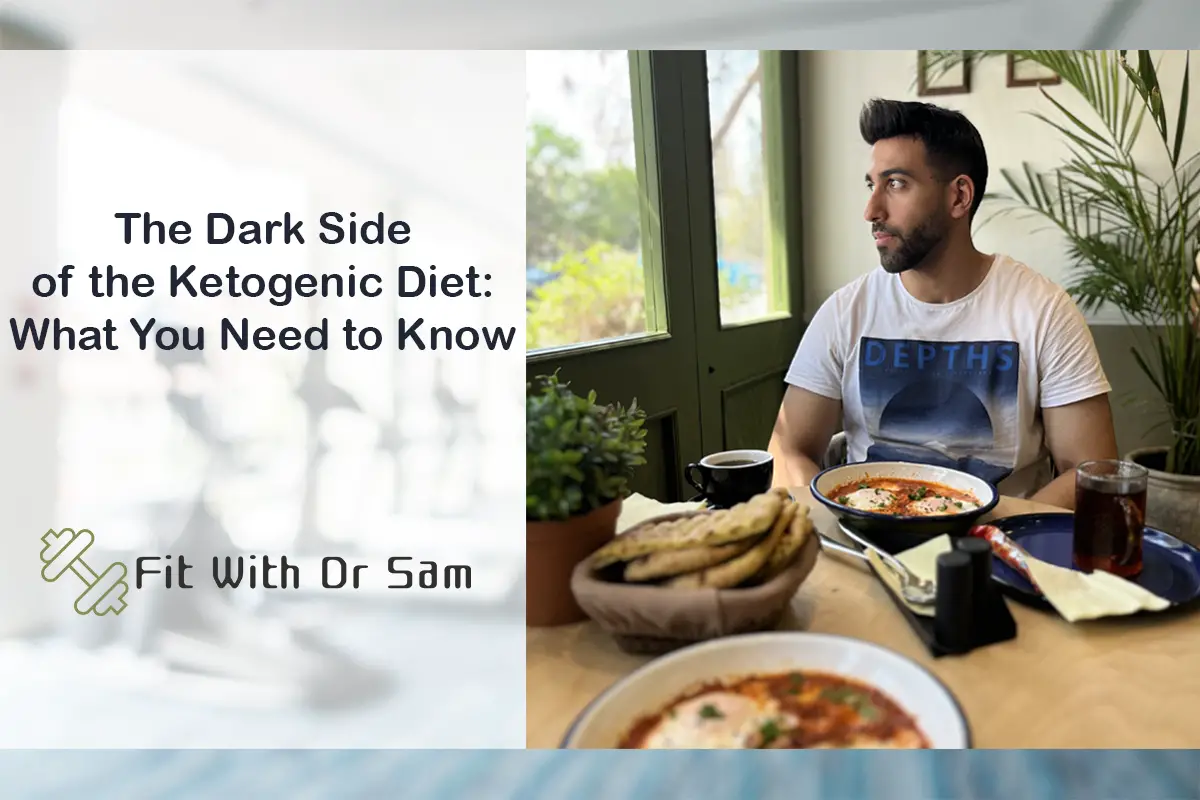The Dark Side of the Ketogenic Diet: What You Need to Know

The ketogenic diet, or keto diet, has recently become quite popular as an impressive method to lose weight and improve your general health. However, what you might not know is that it can actually be quite harmful. In this article, we are going to explain what the ketogenic diet is and explore its potential drawbacks according to scientific evidence. So if you want to find an answer to your questions about ketogenic diet, don’t miss out on this article.
What Is the Ketogenic Diet?
The ketogenic diet is a high-fat, low-carbohydrate eating plan. The main goal in this diet is to shift your body’s energy source from carbohydrates to fats. This shift leads to a metabolic state called ketosis, where your body burns fat for fuel instead of carbs leading to an eventual weight lose and a decrease in your body fat.
In other words, normally, your body uses glucose from carbohydrates as its primary energy source. When you significantly reduce carbohydrate intake, your body starts breaking down fats into ketones, which it then uses for energy. So in this diet your burning fats by eating more fats!

The Drawbacks of the Ketogenic Diet
Until now, just hearing about it, everything sounds ideal. But let’s take a deeper look at this method. What does actually happen to your body when you go through with ketogenic diet. Now it’s time to explore the Drawbacks of ketogenic diet based on research and real life evidence.
Nutrient Deficiencies: can you get enough?
One of the main concerns about the ketogenic diet is that it can lead to nutrient deficiencies. By cutting out certain food groups or extremely reducing their intake, you might not get enough essential vitamins and minerals. According to a study published in MDPI, the keto diet can result in low intake of important nutrients like magnesium, vitamin D, and calcium. These nutrients are crucial for maintaining bone health, muscle function, and overall well-being [1].
How Can I Avoid Nutrient Deficiencies on a Ketogenic Diet?
If you want to avoid deficiencies, it is important to carefully plan your meals and consider taking supplements. Eating a variety of low-carb vegetables, nuts, seeds, and fatty fish can help. For example, adding spinach and kale to your diet can boost your magnesium intake, while fatty fish like salmon can provide vitamin D. Don’t forget to take supplements to ensure adequate intake of these vital nutrients.
Increased Risk of Heart Disease: Which Type of Fat to Choose?
While the keto diet focuses on high fat intake, the type of fats you consume matters. Saturated fats, found in butter and red meat, can increase the risk of heart disease. A study published in the Harvard T.H. Chan school of public health found that high intake of saturated fats is linked to higher cholesterol levels and increased heart disease risk [2].
On the other hand, unsaturated fats, found in foods like avocados, nuts, and olive oil, can have the opposite effect, helping to lower LDL cholesterol levels and reduce the risk of heart disease.

Can I Follow a Heart-Healthy Ketogenic Diet?
Yes, by choosing healthier fats like those found in avocados, olive oil, and nuts, you can make the keto diet more heart-friendly. It’s also better to limit the intake of red meat and dairy products high in saturated fat and instead add fish, poultry, and plant-based protein sources to your daily diet. By doing so you can benefit from the positive effects of ketogenic diet while minimizing the risks associated with high saturated fat consumption and heart disease.
Digestive Issues: How Does Ketogenic Diet Affect Your Gut Health?
Another common issue with the ketogenic diet is digestive discomfort. This can include constipation, diarrhea, and bloating. These problems often happen because the diet is low in fiber, which is essential for healthy digestion. According to a research in national library of medicine, low fiber intake can lead to digestive issues and affect gut health [3].
Fiber plays a vital role in promoting regular bowel movements and preventing constipation. It also serves as a food source for beneficial gut bacteria, supporting a healthy gut microbiome. Without adequate fiber, individuals on the keto diet may experience difficulty in maintaining regular bowel movements, leading to discomfort and potential long-term digestive problems.
How Can I Improve My Digestive Health on a Keto Diet?
Try to focus on including fiber-rich, low-carb vegetables in your diet, such as broccoli, cauliflower, and leafy greens. Similarly, consider incorporating seeds like chia and flaxseeds, which are high in fiber and can help promote healthy digestion. Staying hydrated and consuming probiotics can also support gut health.
What Is Keto Flu?
Many people experience flu-like symptoms when they first start the ketogenic diet. This phenomenon, known as the “keto flu,” includes headaches, fatigue, nausea, dizziness, and irritability. The keto flu is a result of the body adjusting to a new energy source and can be quite uncomfortable. According to a study published in Frontiers in Nutrition, these symptoms are common during the initial phase of the ketogenic diet and typically resolve within a few days to a week [4].
But what happens? What makes you feel this way?
Well, the sudden reduction in carbohydrate intake can lead to a significant drop in blood sugar levels, causing feelings of weakness and fatigue. As the body starts to use up its glycogen stores, it releases water, leading to dehydration and an imbalance of electrolytes. This can contribute to symptoms like headache, dizziness and fatigue.
How Can I Stay Sway from Feeling the Keto Flu?
To ease the symptoms of the keto flu, ensure you stay hydrated by drinking plenty of water and consider supplementing with electrolytes like sodium, potassium, and magnesium. Also its important to gradually reduce your carbohydrate intake rather than making a sudden change.
How Long Can I Continue the Ketogenic Diet?
Another significant drawback of the ketogenic diet is its long-term sustainability. The restrictive nature of the diet can make it difficult for many people to stick to it over the long term. A study has found that while the keto diet can be effective for short-term weight loss, many individuals struggle to maintain the diet and eventually regain the weight they lost [5].

Is Ketogenic Diet Healthy for Everyone?
The ketogenic diet’s strict rules can affect both your physical and mental health. Additional to all those drawbacks we talked about, the emphasis on calculating everything you eat and monitoring food intake can lead to obsessive behaviors and an unhealthy relationship with food. According to a study in the Journal of Eating Disorders, restrictive diets like keto can increase the risk of developing unhealthy eating patterns and body image issues [6].
Impact on Physical Performance
The ketogenic diet can also impact physical performance, especially in high-intensity activities that rely on quick energy from carbohydrates. So it can also effect your workout sessions.
According to a study in nutrients while the keto diet may enhance endurance in low-intensity activities, it can impair performance in high-intensity, anaerobic exercises [7].
Conclusion
The ketogenic diet has recently become quite popular. You need to know that while this method can offer benefits like weight loss and improved metabolic health it also has a dark side. Some of the potential drawbacks and main risks of ketogenic diet include nutrient deficiencies, increased risk of heart disease, digestive issues, the keto flu, long-term sustainability challenges, disordered eating, and impacts on physical performance. By understanding these risks and taking steps to mitigate them, you can make a more informed decision about whether the ketogenic diet is right for you or not!
References
[1] https://www.mdpi.com/2072-6643/15/6/1418
[2] https://www.hsph.harvard.edu/news/press-releases/saturated-fats-increased-heart-disease-risk/
[3] https://www.ncbi.nlm.nih.gov/pmc/articles/PMC9787832/
[4] https://www.frontiersin.org/journals/nutrition/articles/10.3389/fnut.2020.00020/full
[5] https://www.ncbi.nlm.nih.gov/pmc/articles/PMC9312449/
[6] https://jeatdisord.biomedcentral.com/articles/10.1186/s40337-021-00407-7
[7] https://www.mdpi.com/2072-6643/13/8/2896





